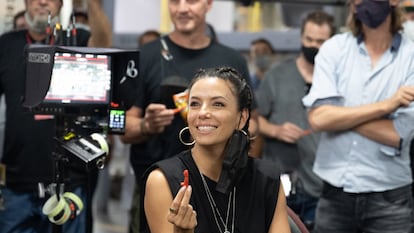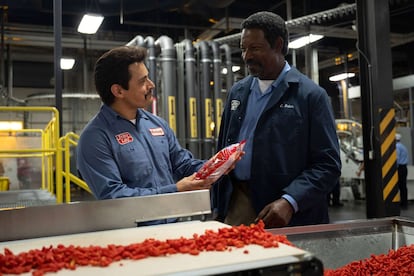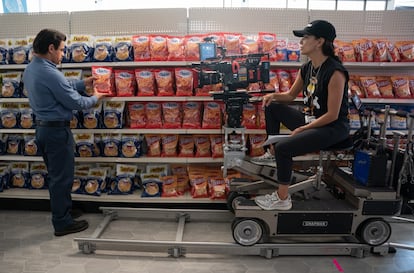The story of Flamin’ Hot Cheetos: A legendary tale now coming to the big screen
Eva Longoria is making her feature film directing debut with ‘Flamin’ Hot’ (Disney+), the story of the Latino janitor credited with the creation of this snack, in a tale of integration, strife and excesses


It was a matter of life and death. At one of the factories belonging to Frito-Lay, a subsidiary of PepsiCo that produces all kinds of potato chips and snacks, the fear of layoffs as a result of a market in crisis seized its workers. Yet one janitor, Richard Montañez, born on the outskirts of Los Angeles to a Mexican family, insisted that the Latino community did not eat Cheetos — the company’s flagship product — and that potential customers did not have a flavor that matched their tastes in the stores. Inspired by a video featuring Frito-Lay CEO Roger Enrico, Montañez created a spicy recipe at home that, when mixed with Cheetos, became an explosive, yet tasty snack: Flamin’ Hot Cheetos were born. He immediately contacted Enrico directly to share the idea with him and get his approval. When he got the green light, he went one step further. In the face of the marketing department’s incompetence, Montañez, along with friends and family, multiplied sales efforts to create demand for those Cheetos designed for hardened appetites. His venture succeeded, and he was immediately promoted to director of multicultural community marketing, leaping from janitor-cleaning boy to the office. This is a story of achievement, a magnificent triumph of the American dream, with only one catch: it’s a lie. Or at least there is little truth in the story. Somewhere between the reality and the myth, the myth came to fruition.
When Eva Longoria (Corpus Christi, Texas, 48) was offered the chance to direct Flamin’ Hot for Hulu (it premiered Friday, June 9, on Disney+), Montañez had already published a book detailing his experience and garnered prestige in the U.S. Hispanic community through his motivational speaking, to which he devoted himself after retiring in 2020. “I’m Mexican-American like Richard, and yet when I read the script, I didn’t know his story,” Longoria said last week in a video call. “Two things were clear to me at the time: that it would inspire other people and that I was the only one who could direct this film.” The actress goes on to explain: “I’m a producer, I want to portray things about our community, and unfortunately, we don’t have many Latino heroes here in Hollywood. Who can you see on the big screen that you can relate to? No one. I was looking for something like that, and I got this project.”

Longoria is a shining example of how the Latino community in the U.S. has evolved. Until the turn of the century, very few felt proud of their roots. The majority, especially new arrivals, preferred to immerse themselves in the white mainstream cinema, going to see the latest Spider-Man movie rather than watching a film starring someone with a ‘ñ’ in their surname, a common move among immigrants in a bid to feel accepted. Nowadays, being Latino “warms the heart,” explains the filmmaker. “I personally didn’t speak Spanish as a child at home. I have learned it in the last ten years, because I’m married to a Mexican [former Televisa executive Jorge Bastón, her third husband] and I live in Mexico. My mom really urged me and my sisters to speak English without an accent. That dilution was encouraged. Now in the U.S., people are very proud of the mixed race, so many people look for their roots to celebrate them. And I love this. Actually, I don’t live in Mexico, I live in this world. The understanding of our cultures adds more compassion to humanity. And I apologize for my Spanish [laughs].”
After filming got underway, the Los Angeles Times published a piece revealing that most of Montañez’s story was a complete fabrication, and that the executive had actually taken advantage of everyone involved in the creation of the new Cheetos being either retired or deceased. It turns out he did not invent them, as Enrico was not yet in office when they were conceived. Nor was the protagonist of the fairy tale a janitor at the time of the commercial launch of the spicy snacks: he had already been promoted to machine foreman. Montañez was involved in its launch (albeit after testing across the U.S.), and he did work his way up the company’s corporate ladder from the lowest rank. He responded in Variety, defining himself as “the greatest ambassador of the Flamin’ Hot line,” and a PepsiCo statement later said that Montañez had been instrumental in the development of those Cheetos, but was not their creator: “No clear link has been established between Montañez’s story and the team whose spicy product proposal was tested in the market,” they point out.

Longoria’s response to this investigation is categorical: “I found out about it after its publication, when a number of friends asked me if I’d read it, and it didn’t alter the script at all. It’s Richard’s life, his suffering, his perspective. PepsiCo knows that Montañez threw himself into this product, that he brought it into the homes of our community. For me, the Flamin’ Hot product is made by Frito-Lay, but the real owners of the brand are the Latinos.” The director has no hesitation even after a further concern: what if the audience is appalled by such a difference between the historical version and Richard’s? “No, because nothing happened after the article was published. I insist, this is not a documentary, but his version. And it’s full of wonderful anecdotes, verbal games, and discoveries that we have tried to portray on the screen.”
“I love television, I’m going to do television all my life”
One of the tweaks Longoria requested in the script was the inclusion of Judy, the main character’s wife. In the late 1970s, there was no shortage of Latinas in the society, but even Caucasian women were not able to move up in the corporate ladder: “Of course, there was no room for women in those days. When I met the Montañez family, I understood that they had been engaged in a love story for decades, that she had been the driving force behind it. I asked to rewrite the script, putting Judy at the heart of Flamin’ Hot.”
Since she rose to fame with the first season of Desperate Housewives in 2004, Longoria has favored television over other audiovisual formats. As a director, she has prioritized making episodes of series and feature-length documentaries over a film, which she has accomplished with Flamin’ Hot. After being screened at the last SXSW festival, the production went directly to the Hulu platform and then to Disney+. “Bob Iger [Disney CEO] saw it when he returned to the position, and he went out of his way to support it. They realize that they have a huge Mexican market to cater to and that they have few opportunities like this. And for me, I love that it will be seen all over the world at home: many families will be able to see it without paying for five tickets,” she says. And she will not stray far from television, even filming in Spain, such as the series Land of Women, with Carmen Maura. She is categorical: “I love television, I’m going to do television all my life. It’s faster, it hits audiences sooner, and you can develop the characters better and over time, building them up over several seasons.”
Sign up for our weekly newsletter to get more English-language news coverage from EL PAÍS USA Edition
Tu suscripción se está usando en otro dispositivo
¿Quieres añadir otro usuario a tu suscripción?
Si continúas leyendo en este dispositivo, no se podrá leer en el otro.
FlechaTu suscripción se está usando en otro dispositivo y solo puedes acceder a EL PAÍS desde un dispositivo a la vez.
Si quieres compartir tu cuenta, cambia tu suscripción a la modalidad Premium, así podrás añadir otro usuario. Cada uno accederá con su propia cuenta de email, lo que os permitirá personalizar vuestra experiencia en EL PAÍS.
¿Tienes una suscripción de empresa? Accede aquí para contratar más cuentas.
En el caso de no saber quién está usando tu cuenta, te recomendamos cambiar tu contraseña aquí.
Si decides continuar compartiendo tu cuenta, este mensaje se mostrará en tu dispositivo y en el de la otra persona que está usando tu cuenta de forma indefinida, afectando a tu experiencia de lectura. Puedes consultar aquí los términos y condiciones de la suscripción digital.








































